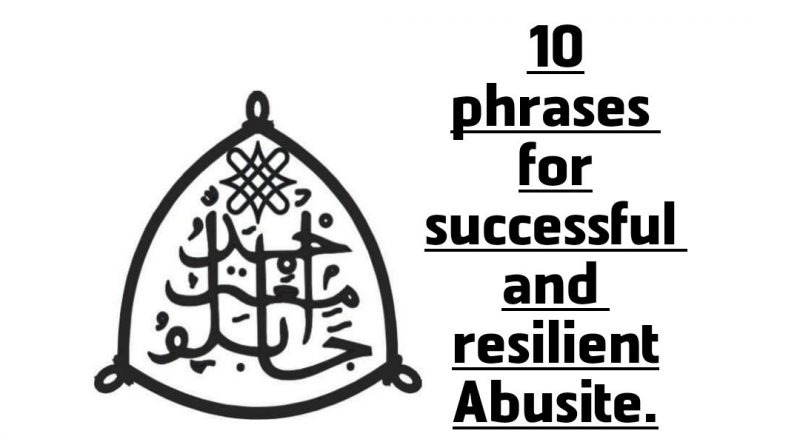Growth Mindset for Students: 10 Phrases Every Student Should Use
The words and phrases you use as you talk to yourself shape the way you feel. Your self-talk can make you feel discouraged, or it can lift you up. As an abusite who is naturally ahead of others, it’s important to pay attention to the words you use as you talk to yourself and others about your frustration
Here are 10 phrases Abusites can use to remain naturally ahead and become more successful and resilient.
10 phrases that students with a growth mindset use
1. “I get to” (don’t say “I have to”)
Instead of saying “I have to”, say “I get to”. The words “I have to” create a feeling of annoyance. The task at hand will become a burden that you can’t escape from. But if you say “I get to”, you’ll create a feeling of opportunity and gratitude. The task will seem like a privilege instead of a chore.
For example, don’t say to your parents that you have to take part in the school play. Instead, try saying: “I get to participate in the play and see if acting is something I enjoy.” Notice the difference? Now, it’s not a burden; it’s an opportunity.
Here’s another example. Instead of thinking to yourself, “I have to go to school”, try saying to yourself, “I get to go to school”. You’ll instantly feel happier! You’ll also feel more motivated to go to school and to study. You’ll also remember that millions of children and teenagers around the world want to go to school, but don’t have the opportunity to do so.
2. “I’ll figure it out” (don’t say “I can’t do it”)
There are very few things in life that you simply cannot do. You may need some help, or you may need more information. Almost always, there’s a solution. But when you say “I can’t do it”, it stops you from finding the solution. So say “I’ll figure it out” instead, and you’ll become a more successful and resilient student!
3. “I learned something” (don’t say “I made a mistake”)

Mistakes are valuable lessons in disguise. The more open you are to making mistakes, the faster you’ll learn. But to do that, you have to start seeing mistakes as opportunities to learn. Here’s a real-life example of someone with this attitude.
Thomas Edison famously made 10,000 failed attempts at inventing the light bulb before he succeeded. When a reporter asked him how it felt to fail 10,000 times, Edison replied, “I didn’t fail 10,000 times. I didn’t even fail one time. I succeeded in proving that those 10,000 ways will not work.”
Mistakes are a vital part of the learning process. So, when you make a mistake, say to yourself: “I learned something.”
4. “I’m working on this” (don’t say “I’m bad at this”)
When you say “I’m bad at this”, you send a message to your brain that this is just the way you are. You’re telling yourself that it’s a permanent trait that you can’t change. But this isn’t true. The more you practice anything, the better you’ll get. Look at anyone who’s good at a particular skill.
For example, a painter, a guitarist, or an award-winning writer. Those people are outstanding at what they do because they’ve put in thousands of hours of practice. When you tell yourself “I’m working on it”, you’re reminding yourself that learning is a process that takes effort. You’re also reminding yourself that if you keep at it, you’re sure to make progress.
5. “This will take some time” (don’t say “I’m not smart enough”)

As a student of ABU Zaria, you’ll come across something you don’t understand every day. It might be an equation, a formula, a theory or it might be a word you don’t know the meaning of. When you don’t understand something, it’s natural to think: “This is too hard – I’m not smart enough.”
But try saying this to yourself instead: “This is complicated – it will take some time to understand it.” Let’s face it: some subjects and topics are complicated. But that doesn’t mean you’re not smart. It just means that you need more time. Keep persevering and the pieces of the puzzle will fall into place. Over time, you’ll become a better and more resilient student
6. “I don’t” (don’t say “I can’t”)
A big part of being a successful student at Ahmadu Bello University is learning to say no to temptations. The first thing is to accept that temptations will arise. The temptation to go play at the social center, 90ties, love garden, etc when you should be studying. Or the temptation to stay up late, when you know you should go to bed.
What’s important is how you deal with such temptations. Research has shown that the way we talk to ourselves plays a big role in how we deal with temptations. For example, you might say to yourself: “I can’t watch TV because I haven’t finished my homework.” This kind of self-talk tends to increase the level of temptation because it focuses your attention on something you can’t do (watch TV).
Instead, try saying to yourself: “I don’t watch TV until I’ve finished my homework.” Do you notice the difference? Instead of feeling restricted, the second statement makes you feel powerful and in control. The temptation has suddenly shrunk in size. Why? Because now you have the power, not the temptation. So start developing the habit of saying “I don’t” instead of “I can’t”!
7. “I will” (don’t say “I should”)

Instead of saying that you should do something, try saying that you will do it. One problem with saying “I should” is that it can easily turn into wishful thinking. You aren’t making a commitment to take positive action. That’s why it’s better to replace “should” statements with “will” statements.
Instead of saying “I should exercise more often”, try saying “I will exercise more often”.
Instead of saying “I should manage my time better”, try saying “I will manage my time better”.
Instead of saying “I should pay attention in class”, try saying “I will pay attention in class”.
“Will” statements empower you to make a change. On the other hand, “should” statements trap you in a state of inaction.
8. “How can I keep improving?” (don’t say “I’m already good at this”)
When you think about your performance in different subjects or activities, you might be tempted to say, “I’m already good at this.” But it’s better to say to yourself, “How can I keep improving?”
Let’s say you’re one of the best student in your class. If you tell yourself that you’re already a good student, so you don’t need to practise more, then you won’t maximise your potential. But if you focus on improving, then you’ll become an even better student. The process is what counts, and there’s always room for improvement. It’s by understanding this principle that world-class performers become the best in their field.
9. “I’ll find out” (don’t say “I don’t know”)
When you don’t know the answer to something, instead of saying “I don’t know”, try saying “I’ll find out”. With the Internet, there’s never been another time in human history when it’s been so easy to gain access to knowledge. If you adopt this “I’ll find out” mindset, you’ll enlarge the horizons of your knowledge. But if you say “I don’t know”, you’ll close the door to expanding your mind.
10. “This is a challenging opportunity” (don’t say “This is a problem”)

In your life as a student of Ahmadu Bello University, you’ll face challenges that seem insurmountable. Imagine that you’ve prepared a speech to give to your class. At the last minute, you realise that you’ve lost your notes. You’ll be delivering the speech in three minutes. What will you do?
Instead of seeing the situation as a problem, look at it as a challenging opportunity. Because you don’t have your notes, you’ll speak more spontaneously. You’ll also make more eye contact with your audience. Your teacher might even congratulate you on giving a fantastic speech! And it’s all because you turned a problem into a challenging opportunity.
Conclusion
Here’s a table that sums up the key points of this article:

Life as an ABU Student is full of challenges. The words you use when you talk about these challenges affect the way you deal with them. Language is powerful because it shapes the way we think. In our self-talk, we all have a tendency to use words that limit our ability to deal with challenges.
When you next face a challenge, change the words you use to talk about it. Use the positive phrases listed in this article and observe the difference it makes. You’ll gain a sense of power and develop a success mindset, one phrase at a time. You’ll become a better Abusite who’s more resilient too. So I encourage you to get started today!
Credit: Daniel Wong









Thank you for this.It will surely motivate alot of students.
A very beautiful and useful piece.
Wow! Very vital.